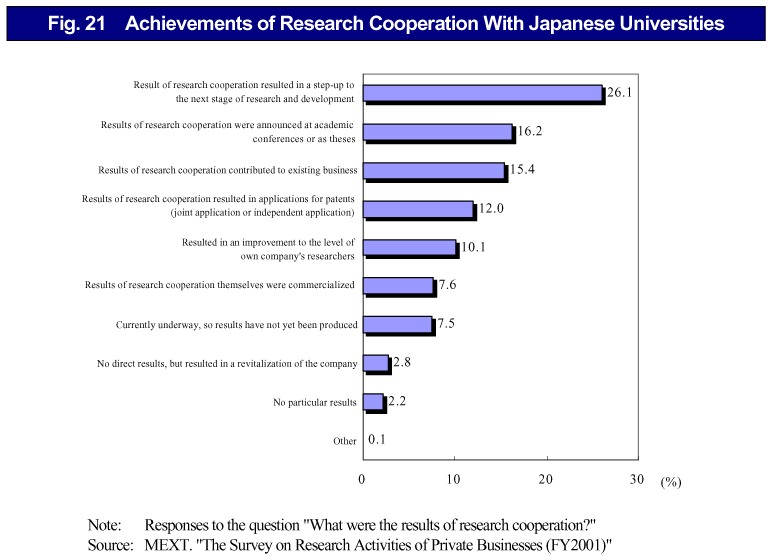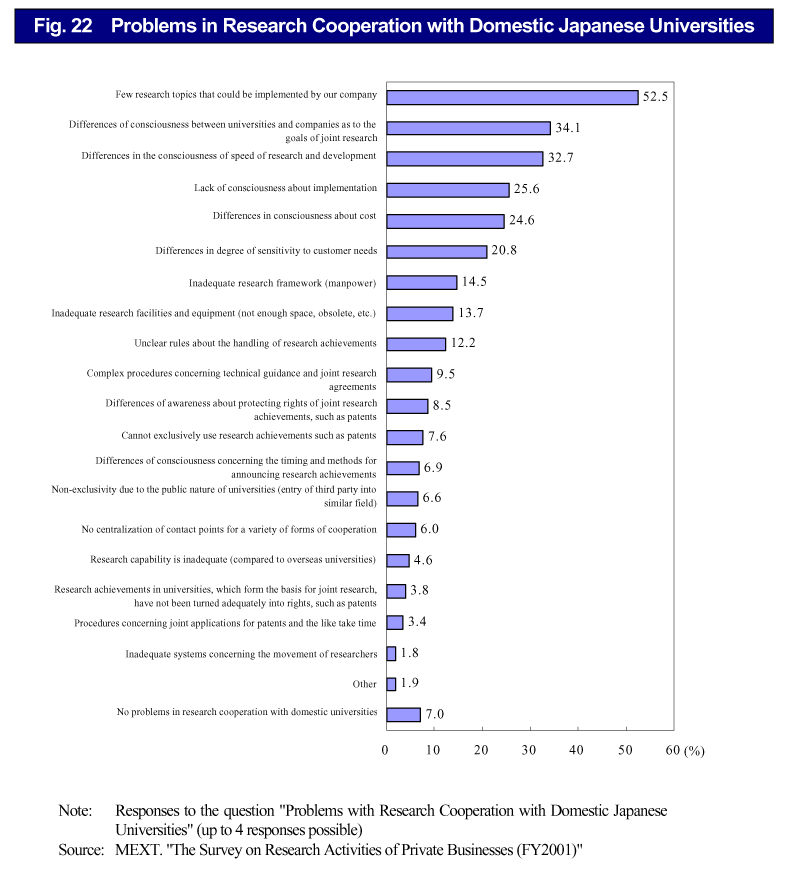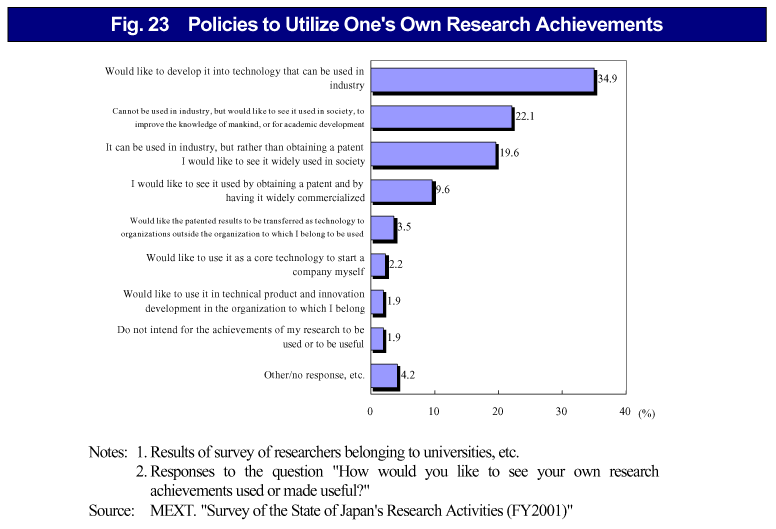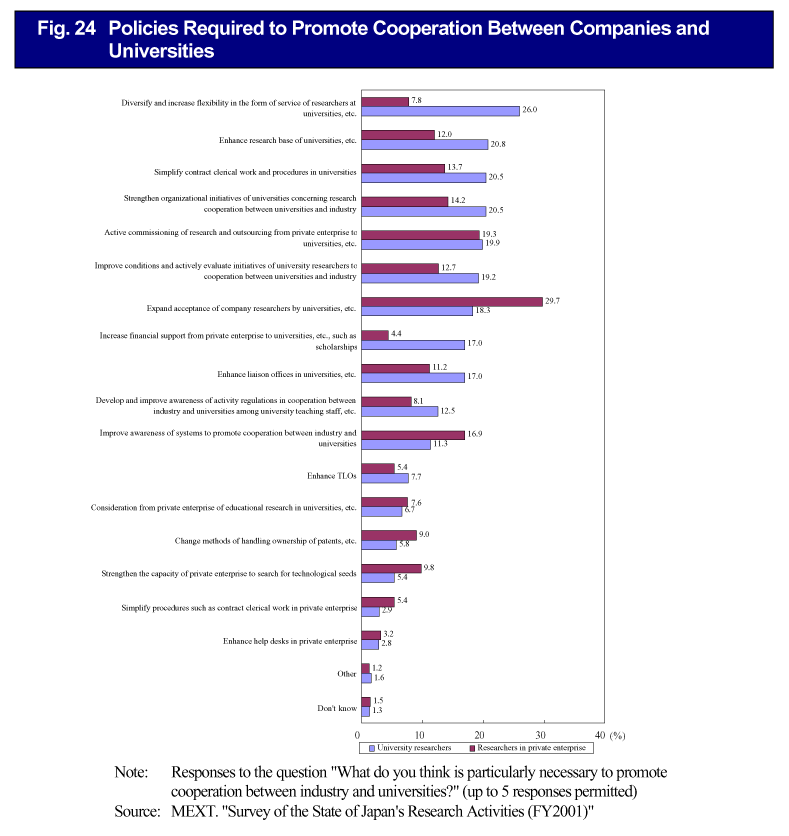| Home > Policy > White Paper, Notice, Announcement > White Paper > Annual Report on the Promotion of Science and Technology 2002 > Part1 Chapter3 Section4 1 | ||
| (Efforts to Cooperate with Private Corporations in Universities) |
In the situation where companies are placing greater and greater expectations on universities, and cooperation between the two is strengthening, there is an active movement among universities to actively create research cooperation frameworks with companies, by promoting joint research with, by promoting utilization of research achievements by TLOs (Technology Licensing Organizations), and by promoting interaction of personnel by having lecturers at national universities also appointed as directors of companies.
| (Results of Cooperation Between Companies and Universities) |
In response to the progress in cooperation frameworks, research cooperation between companies and universities has produced results in almost all cases ( Fig. 21 ).

In this way, while achievements of cooperation between companies and universities are steadily being generated, the expenditure of research expenses on universities within Japan and the percentage of research expenses borne by companies continues to remain at around the same level. The main reason why expenditure of research expenses on universities within Japan has not increased is that research cooperation between Japan's companies and domestic universities in the past was mainly the exchange of information based on relationships between individuals, such as specific companies and specific research laboratories.
At any rate, problems have also been pointed out in carrying out research cooperation with universities within Japan, so it is necessary that both universities and companies work to develop systems that allow an environment which facilitates such cooperation, and that mutual understanding concerning the role played by the two parties is deepened ( Fig. 22 ).

| (Improvement in Awareness in Universities of Social Contribution Through Industry) |
In the past it was often said that researchers had a low awareness of cooperation between academia, industry and government, and contribution to society, but there is a change occurring in the consciousness of researchers ( Fig. 23 ).

One of the factors in the background to this change is the development of legal systems to promote cooperation between academia, industry and government and the progress in joint research that has taken place in recent years. It is therefore necessary for universities to development frameworks to actively evaluate initiatives for cooperation between academia, industry and government that result in the acquisition of patents, such as joint research with companies concerning the evaluation of performance of university lecturers, thereby responding appropriately to changes in the consciousness of university researchers.
| (Promoting Cooperation Between Organizations) |
As an issue facing cooperation between companies and universities, companies today are requesting that universities engage in research cooperation that may for example extend across multiple fields, to enable the company to create new value. This type of cooperation is no longer something that can be handled by the relationships at a personal level that have existed in the past, and organizational initiatives are being required of universities. In the future, universities must develop frameworks for cooperation between companies and universities after developing clear rules based on an awareness of the mutual need between industry and universities as "organization to organization" needs ( Fig. 24 ). Furthermore, it is necessary to revitalize competition between universities for initiatives concerning contribution to society, by putting in place a cooperative environment by enhancing the allocation of indirect expenses of contract research expenses from companies.

| (Personnel Exchange Between Private Enterprise and Universities) |
Companies in the past have recognized the merits of dealings on an individual level, but today, with the progress in the development of framework for managing intellectual property rights by universities as organizations, companies have reached the point where they must renew their response. Therefore, while developing rules for cooperation such as handling of confidential information, developing frameworks for organizational cooperation, and striving to become universities that can compete on the same playing field as overseas universities, they must dynamize human exchange by accepting student internships, recruiting Ph. D. graduates, and dispatch corporate researchers to universities, thereby encouraging closer cooperation.
| Back to Top | MEXT HOME |